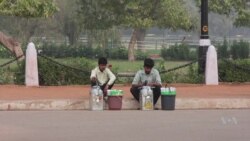As Britain begins the process of leaving the European Union, it is trying to rekindle old trade links with Commonwealth countries. However, the push for new commerce has sparked a debate on the historical legacy of the British Empire, with accusations that ministers are trying to whitewash atrocities committed during colonial times.
British Chancellor Philip Hammond arrived in India for a three-day trip to, in his government's words, "Bang the drum for British business." The quest for new Commonwealth trade links has been dubbed "Empire 2.0."
International Trade Secretary Liam Fox, on a trade mission in the Philippines, wrote on Twitter recently that Britain "Is one of the few European countries that does not need to bury its 20th-century past."
Indian lawmaker and former U.N. Under-Secretary-General Shashi Tharoor, author of the book Inglorious Empire, has a different assessment of Britain's colonial conduct: "Of which the highlights, but only the highlights, include the Jallianwala Bagh massacre in Amritsar in India which killed defenseless, unarmed women, children and men; the use of chemical weapons in Mesopotamia; the air-bombing of a number of innocent civilians in Basra; you have the horrendous partition of India; you have the cruelty with which the Mau Mau insurrection was put down in Kenya."
Despite that history, Tharoor says India is listening carefully to what Britain has to offer.
"The idea that Commonwealth countries represent a possible alternative area for preferential free trade agreements is welcome, provided of course, as in every negotiation, that there is give and take," he said.
But Britain must give more if it wants to benefit, Tharoor added.
India is critical of tightening visa restrictions on its citizens wanting to work in Britain.
Many people working in the $5.6 billion restaurant industry backed Brexit, hoping it would open the door to more migration from Commonwealth countries.
Enam Ali, a chef in an award-winning restaurant just outside London, says he feels betrayed, and warns the industry is in trouble.
"We feel it would be fair policy and we can bring people from outside the EU — from India, Bangladesh, Pakistan — where people can come and look after our business because the industry needs chefs desperately," Ali said. "So this is something now that is happening opposite, because the people we are currently working on, helping hand from the European worker, Romanian and Polish, they are now going to leave. So, what we end up with is nobody to work for us."
Cutting migration was a central pledge of Britain's campaign to leave the European Union, but countries like India want visa restrictions relaxed as part of any trade deal.
Indian lawmakers say they are open to rekindling old trade links, but in the 21st century, Britain will no longer dictate terms.





